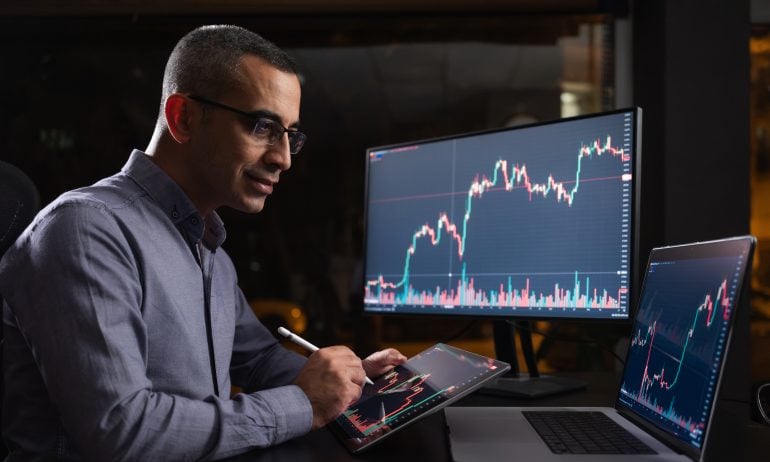Investing in Emerging Markets: EWY, EPU and More Top-Performing ETFs
Emerging markets are developing countries with volatile, fast-growing economies. Investing in emerging markets, through funds such as EWY or EPU can be a way to diversify your portfolio.

Many, or all, of the products featured on this page are from our advertising partners who compensate us when you take certain actions on our website or click to take an action on their website. However, this does not influence our evaluations. Our opinions are our own. Here is a list of our partners and here's how we make money.
The investing information provided on this page is for educational purposes only. NerdWallet, Inc. does not offer advisory or brokerage services, nor does it recommend or advise investors to buy or sell particular stocks, securities or other investments.
Emerging markets, as defined by MSCI, are 24 developing countries with volatile, fast-growing economies.
Emerging market investments can provide diversification and potentially rapid growth to a portfolio, but they can also be risky.
EWY and EPU are among the best-performing emerging market ETFs this year.
You may also be able to buy individual emerging market stocks, although this may not be right for every investor.
Emerging markets, as defined by MSCI, are 24 developing countries with volatile, fast-growing economies.
Emerging market investments can provide diversification and potentially rapid growth to a portfolio, but they can also be risky.
EWY and EPU are among the best-performing emerging market ETFs this year.
You may also be able to buy individual emerging market stocks, although this may not be right for every investor.
The U.S. stock market has experienced dizzying volatility in 2025 related to new tariffs, and many major U.S. stock indexes, such as the S&P 500, are in the red for the year so far. Yet the stock markets of certain developing countries, such as Mexico and Poland, have positive year-to-date returns.
In investing parlance, these developing countries are called emerging markets. Investing in emerging markets can be a potentially profitable way to diversify your investment portfolio, especially during times of economic uncertainty in the U.S.
What are emerging markets?
Emerging markets are countries with fast-growing economies. They’re also called developing economies or developing countries. Emerging markets are often contrasted with so-called “established markets” or “advanced economies” like the U.S., which tend to be wealthier and more stable, but slower-growing.
Index provider MSCI classifies 24 countries as emerging markets. They're listed below:
Brazil
Chile
China
Colombia
Czechia
Egypt
Greece
Hungary
India
Indonesia
Kuwait
Malaysia
Mexico
Peru
Philippines
Poland
Qatar
Saudi Arabia
South Africa
South Korea
Taiwan
Thailand
Turkey
United Arab Emirates
You may notice that certain notable emerging markets, such as Russia, are missing from the list above.
There is no universal standard for noting which countries are emerging markets, and indexers like MSCI often have geopolitical concerns to work around. Russia, for example, is an emerging market by most definitions. But it’s largely unavailable to Western investors for reasons related to the Russia-Ukraine war, so MSCI stopped tracking it in 2022.
Should I invest in emerging markets?
Investing in emerging markets might sound advanced or out of reach for novice investors, but there’s a strong argument for diversifying outside of the U.S. Even simple portfolios, such as those that contain only two or three funds, often include some exposure to international stocks. After all, a stock market crash in the U.S. might not hit international markets as hard.
In 2025, concerns related to the effects of new tariffs have hammered U.S. stocks. But many publicly traded companies in emerging markets do most of their business domestically, and aren't particularly vulnerable to disruptions of trade with the U.S. That's why the Mexican stock market, for example, is up around 16% year-to-date, despite Mexico being hit with heavy tariffs from the U.S. Many of the components of the IPC Mexico index (the Mexican equivalent of the S&P 500) are companies that earn most of their revenue in Mexico.
However, there's a catch. In theory, faster GDP growth in emerging markets should also translate into faster stock market growth, but this doesn’t always work out in practice. Many of the ETFs listed above have underperformed the S&P 500 over the last five years, for a variety of reasons.
Some emerging markets, such as Kuwait and Saudi Arabia, have energy-dominated economies that tend to boom when oil prices are high, and decline when they’re low. Others, such as Poland and Turkey, have unique security risks because they border active war zones.
There’s a common thread between these underperformances: Emerging markets tend to be less stable than established markets. They may be faster-growing, but that fast growth is more vulnerable to interruptions, like shifts in global resource markets or armed conflict.
One way to manage this kind of risk is by investing in several emerging markets at once through a diversified emerging markets ETF, rather than a country-specific one.
» Interested in ETFs? Check out the best ETFs by one-year performance.
9 top-performing emerging market ETFs as of February 2026
Below is a list of the nine best-performing emerging markets ETFs listed by Finviz, ranked by one-year return.
Ticker | Company | Performance (Year) |
|---|---|---|
EWY | iShares MSCI South Korea ETF | 133.85% |
EPU | iShares MSCI Peru and Global Exposure ETF | 124.08% |
FLKR | Franklin FTSE South Korea ETF | 122.22% |
MKOR | Matthews Korea Active ETF | 97.42% |
EMEQ | Nomura Focused Emerging Markets Equity ETF | 85.02% |
ROAM | Hartford Multifactor Emerging Markets ETF | 84.16% |
AFK | MVIS GDP Africa Index | 74.92% |
EMDM | First Trust Bloomberg Emerging Market Democracies ETF | 72.36% |
FTHF | First Trust Emerging Markets Human Flourishing ETF | 72.13% |
Source: Finviz. Data is current as of 2026-02-03 and is intended for informational purposes only. | ||
Of course, it’s worth researching an ETF before you buy it, just as you would research stocks. Different emerging markets ETFs may have different holdings — and if you’re looking for exposure to a specific company in an emerging market, you may want to consider investing in it directly.
» More on index funds: Check out some of the best index funds in terms of long-term performance.
Investing in emerging market stocks
There are a few emerging market stocks that are directly listed on U.S. exchanges — largely bank stocks. For example, HDFC Bank, India’s largest bank, trades on the New York Stock Exchange under the ticker “HDB.”
Some others are available via over-the-counter (OTC) markets — although it’s worth checking an OTC emerging market stock’s trading volume on a website like Yahoo Finance or Google before buying it. Buying a low-volume OTC stock at a good price can be tricky.
Even large conglomerates like South Korea’s Hyundai (HYMTF) are largely overlooked by U.S. investors because they trade OTC. They may only change price a few times per trading day due to a lack of buyers and sellers. That can result in buy or sell orders going through at suboptimal prices, or not going through at all. Limit orders can somewhat mitigate this risk.
A third way to invest in individual emerging market stocks is to open an account with a broker that allows Americans to trade directly on foreign stock exchanges. However, only a few brokers offer this feature, and those that do may have special requirements for would-be foreign stock traders.
It’s also worth considering that you may be subject to the investment taxes and laws of the host country while investing directly in its stock market.
You can check out our list of the best brokerage accounts for stock trading to learn more.
Neither the author nor editor owned positions in the aforementioned investments at the time of publication.






